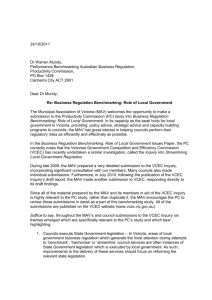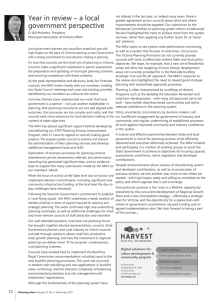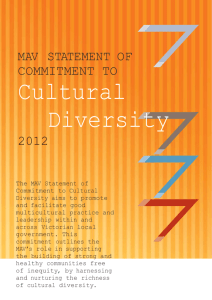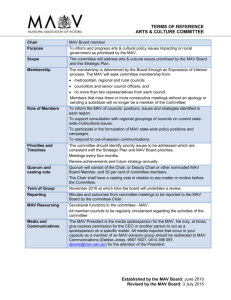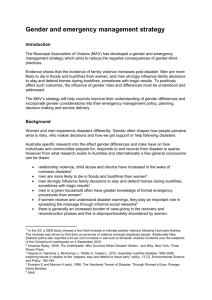MAV submission to Education Council National Quality Framework
advertisement
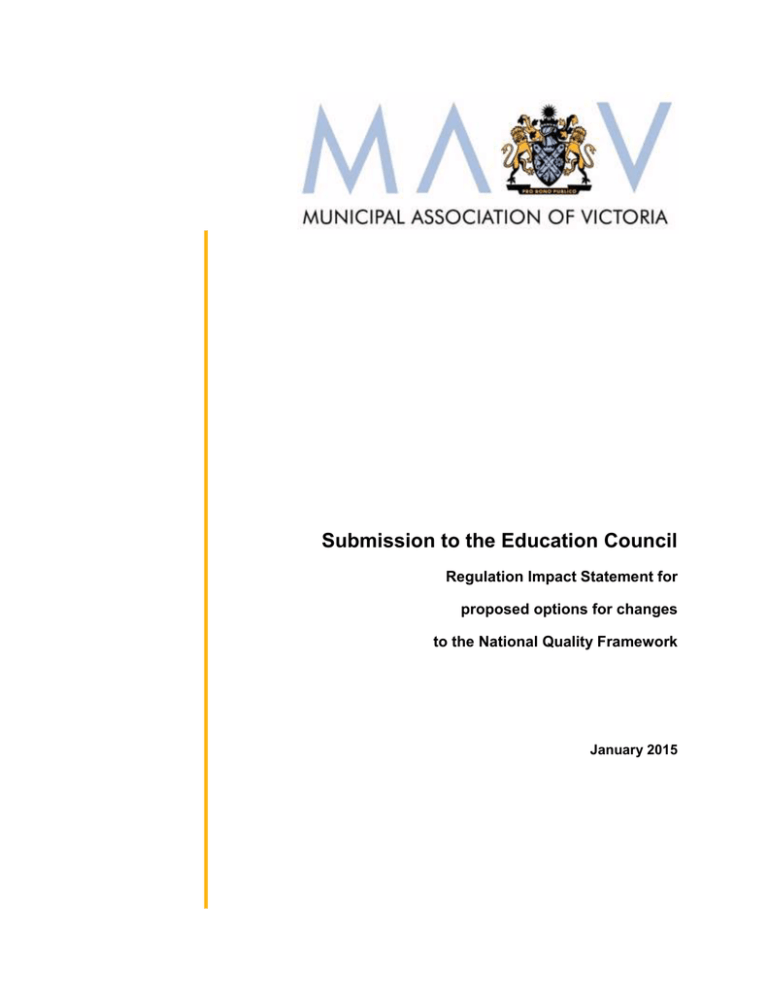
Submission to the Education Council Regulation Impact Statement for proposed options for changes to the National Quality Framework January 2015 © Copyright Municipal Association of Victoria, 2015. The Municipal Association of Victoria (MAV) is the owner of the copyright in the publication No part of this publication may be reproduced, stored or transmitted in any form or by any means without the prior permission in writing from the Municipal Association of Victoria. The MAV does not guarantee the accuracy of this document's contents if retrieved from sources other than its official websites or directly from a MAV employee. The MAV can provide this publication in an alternative format upon request, including large print, Braille and audio. The MAV is the statutory peak body for local government in Victoria, representing all 79 municipalities. The MAV would also like to acknowledge the contribution of those who provided their comments and advice during this project. While this paper aims to broadly reflect the views of local government in Victoria, it does not purport to reflect the exact views of individual councils. 2 MAV submission to Education Council National Quality Framework Regulator 1. Introduction The Municipal Association of Victoria is the peak representative and advocacy body for Victoria's 79 councils. Our role is to represent and advocate the interests of local government; raise the sector's profile; ensure its long-term security; facilitate effective networks; support councillors; provide policy and strategic advice; capacity building programs; and insurance services to local government. The MAV welcomes the opportunity to input into the national agenda for early childhood through this response to the Education Council – Regulation Impact Statement for proposed options for changes to the National Quality Framework. The Association’s members remain critically interested and involved in the provision of child care and early childhood services. Victorian local government has a long history of active involvement, planning and providing services, facilities and advocacy for young children and their families. Councils are the leading provider of early years infrastructure in Victoria. All Victorian councils are committed to the aim of providing children in their municipality with the best possible start in life through effective planning, development and provision of services that improve the health, connectedness, education and care of children and their families. Local government has been integral to the implementation of the 15 hours of Universal Access to Early Childhood Education and the National Quality Framework in Victoria. The collaborative approach of the three levels of government in Victoria should be continued to ensure that access to affordable, high quality early childhood education and care remains a priority and is comparable to Australia’s OECD counterparts. 2. Background Over the past two decades, the MAV has participated in a number of early childhood education and care campaigns, and provided submissions to various government inquiries on early childhood education and care including the most recent Productivity Commission Inquiry into Child Care and Early Childhood Learning. The MAV has been consistent in its position, which is underpinned by the following: 3 Support all families by ensuring affordable and flexibility of choice in high quality childcare options that optimise children’s learning and development. Maintain public investment in a universal approach to early childhood education and care with a priority focus on vulnerable families. Provide infrastructure support for capital, workforce, planning and integration, and regulatory requirements. MAV submission to Education Council National Quality Framework Regulator 3. All levels of government planning and funding be reviewed to ensure greater collaboration and used more strategically. The value of quality early childhood education and care There is good international and emerging Australian evidence about the value of quality early childhood education and care (ECEC) particularly in terms of outcomes for vulnerable children. The evidence shows that quality ECEC improves literacy and numeracy which in turn can lead to higher earning capacity of that child. This then leads to a range of benefits for a country including growing its GDP. With an increasing emphasis on participation of children not currently attending ECEC, it is important to continue the implementation of the National Quality Agenda in order to achieve the longer-term goals of reducing disadvantage, increasing workforce participation and decreasing expenditure associated with remedial education, justice and health services1. In its report ‘Putting a value on early childhood education and care in Australia’ Pricewaterhouse Coopers estimated the cost of improving the quality of ECEC at $45 million on average per annum between 2015 and 20192. Clearly at that level, the Commonwealth and State governments need to continue and increase their level of investment and expenditure on improving access to and the quality of ECEC for children. 4. Key issues of concern to councils remain: 1 2 4 Balancing the needs for increased quality against the continuing costs for the reforms and the impacts on services. The responsibilities of Commonwealth and State governments, and service providers in financing the ongoing costs of the National Quality Framework in particular the introduction of the 2016 educator to child ratio changes. The required rates of growth and appropriate funding of the early childhood workforce remains an outstanding issue that has not yet been adequately addressed by Government. That the timeframe outlined in the Implementation and Evaluation Plan be reviewed to allow for the full implementation of the NQF and for the remaining 54% of all approved children’s education and care services that have not yet received a quality rating (as at 30 September 2014) to be assessed and rated. Pwc, 2014 Putting a value on early childhood education and care in Australia. Pg. 5 Pwc, 2014. Putting a value on early childhood education and care in Australia. Pg.31 MAV submission to Education Council National Quality Framework Regulator 5. Recommendations The MAV makes the following recommendations in response to the proposed options for changes to the National Quality Framework. 6. i. The MAV continues to support a nationally oversighted system which is implemented at the local level by the State. ii. Support for the proposed options and reforms is contingent upon funding being provided by the Commonwealth and State government for the increased recurrent costs for implementing changes in kindergarten and childcare. iii. That the problems identified in the review regarding inconsistent application and interpretation of the National Quality Framework by State regulators and providers is addressed to ensure the integrity of the NQF going forward. iv. That the Commonwealth Government consults with the sector separately on Family Day Care (FDC) and includes all aspects of policy and legislation, not just those that apply in the NQF RIS. v. That further research of the benefits and costs of the proposal to have nationally consistent ratios of educators to children for Outside School Hours Care is undertaken. vi. That the Commonwealth Government reviews the proposed timeframes of January 2016 for implementation and evaluation as the sector will still be in the process of implementing the current reforms. Options for consideration 6.1 Refining the National Quality Standard and assessment and rating process The proposal to remove or consolidate some of the 58 elements and 18 standards of the National Quality Standard is to be commended as it should result in reduced complexity and conceptual overlap. The proposed refining of the language used to describe the standards and elements will require educators and services to ensure they do understand what is being reflected in each of the standards and elements. Feedback to the MAV from Victorian local government indicates that the proposal to streamline the process for quality assessments is viewed positively. A key comment is that the current Assessment and Rating Tool is vague regarding the difference between the ratings of ‘meeting the requirements and exceeding the requirements3. The Assessment and Rating process needs to be standardised to ensure greater consistency of application of approach and understanding by all involved in the process. However, the MAV believes that before any further changes are made to the NQF, that a full cycle of implementation including the Assessment and Ratings process is completed. Our understanding is that currently ACECQA has not completed its program of assessing and rating all eligible services and as at 30 September 2014 some 54% of all eligible services were yet to 3 5 ACECQA – Report on the National Quality Framework and Regulatory Burden: 2013 pgs. 43 -64 MAV submission to Education Council National Quality Framework Regulator receive a quality rating. Therefore services that have not yet been assessed or rated should have that process undertaken under the same NQS regime as those services who have already been assessed and rated. This arguably should then better prepare and position services for the proposed new regime of undertaking self-assessment, and will also better inform ACECQA of those services who perhaps aren’t in the best position to actually undertake self-assessment and need more support. The proposal to reword but not remove the Significant Improvement Rating is considered by local government as important. By amending the definition, so it refers to a rating that may be applied if there is significant non-compliance, rather than the concept of unacceptable risk to children would appear to make sense. The MAV believes the proposal to retain the Excellent Rating should be implemented as such a rating provides the incentive and aspiration for services to become sector leaders and recognises their excellence in providing an excellent quality service. With regard to the proposal to ensure ratings accurately reflect service quality, the MAV supports the proposal for no change and retention of the current requirements that all elements of the NQS must be met to achieve an overall rating of Meeting the National Quality Standard. The proposal to clarify or streamline the National Quality Standard will result in ratings that are a more accurate reflections of service quality and therefore services should be required to meet all elements in order to receive a rating of Meeting the National Quality Standard. Rather than diluting the rating systems, ACECQA and Federal and State governments have a responsibility to strengthen the sector’s and regulator’s understanding and acceptance of what these ratings mean. The current assessment and rating cycle is based on an earned autonomy system, where the period between the assessment and rating process is determined by the service’s current rating. Given that a significant proportion of services nationwide have not yet been assessed, it is very premature to change the timing of the rating cycle. Although three options have been proposed, the MAV recommends the position that no change been made at least until all services have been rated in the current cycle. 6.2 Removing supervisor certificate requirements The concept behind the requirements for supervisor certificates to ensure consistency of skills and experience for nominated supervisors and persons placed in day-to-day charge remains valid. However, clearly through the consultation and feedback received, this issue emerged as being inefficient in process and ineffective in intended outcome. The MAV would like to see that the intended outcomes of the concept behind the supervisor certificate are captured through other means including the assessment and rating process. 6.3 Expanding the scope of the NQF The MAV supports all children having access to quality services regardless of service type. However the NQF would need to be flexible enough to take into account the different service delivery required for those services that are currently out-of-scope. For example Occasional Care program planning when children are coming and going cannot be undertaken in the same manner as program planning for preschool or long day care. 6 MAV submission to Education Council National Quality Framework Regulator 6.4 Extending some liability to educators Currently under the National Law, the approved provider, nominated supervisor or Family Day Care (FDC) educator may be liable for failing to adequately supervise children under their care or where they have not taken every reasonable precaution to protect the children from harm or hazard. The MAV supports the concept of all children being protected from harm or hazard when in the care of an early childhood education and care service, and also strongly supports the role of the service to ensure its educators are providing adequate supervision, understand the importance of and how to identify and manage risks, and that they understand their roles and responsibilities to the children in their care. The role of professional development, performance management and mentoring and supervision of educators is paramount in ensuring all children are safe and breaches do not occur. 6.5 National educator to child ratios for OSHC services The concept of a national standard for OSHC is one worthy of further discussion and debate. Currently all States and Territories except for NSW have ratio requirements of OSHC with all but ACT and WA using a 1:15 ratio. Given there is no strong evidence of what ratio would deliver the best outcomes for children the MAV views it as important that further research in this area is undertaken given the range of complexities, different environments and age of children attending this type of service. 6.6 Improved oversight of and support within FDC services Over 40 councils provide Family Day Care (FDC) Services in Victoria. Over the past 12 months there have been a number of significant changes to eligibility for FDC services to access Community Support Program funding, and more recently in late December 2014 a capping of the funding FDC services will receive until June 2015 and the implementation of a new requirement that FDC Services operating across multiple jurisdictions must now be registered in each jurisdiction. Family Day Care services have been subject to wholesale change at a time when the sector is likely to experience further significant change and the intended and unintended consequences of these changes are yet to be seen. MAV believes that FDC already supports the objectives which the Australian Government has commissioned for this Inquiry including: supports workforce participation, particularly for women is more flexible to suit the needs of families, including families with non-standard work hours, disadvantaged children, and regional families The information outlined in the NQF RIS and the proposals for further changes to FDC cannot be examined without looking to the other policy and legislative changes that are and have been made to FDC. 7 MAV submission to Education Council National Quality Framework Regulator The MAV recommends that the Commonwealth Government consults with the sector separately on FDC and include all aspects of policy and legislation, not just those that apply in the NQF RIS. 6.7 Educator breaks The NQF RIS proposes that guidance on educator breaks is amended to make it clear that service providers must comply with their legal obligations and must meet prescribed ratio requirements at all times, subject to jurisdiction-specific transitional arrangements. The MAV welcomes the concept of guidance and clarity, however further discussions with State jurisdictions should be undertaken to ensure that the advice provided to the sector is accurate and understood given the implications for employment, funding and industrial agreements. 6.8 Implementation and evaluation plan The MAV believes that quality ECEC services are of paramount importance and strongly supports the principles of the NQF. The extensive efforts of the early childhood sector to implement and comply with the new regulatory requirements are to be commended and should be seen as part of building a sustainable future for early childhood education and care through a professionalisation of the sector which in turns builds confidence in the community. This is still a work in progress and as such the full costs of improving the quality of ECEC for all Australian children are difficult to quantify. In a recent Australian Children’s Education and Care Quality Authority (ACECQA) Reporti Victorian providers generally felt that there was an increased administrative burden but that it wasn’t any more complicated than what they have experienced in the past. Victorian Councils have been planning for NQF implementation in a staged manner to carefully balance viability and affordability to minimise financial impact on ratepayers and families. The proposed date for the introduction of all potential legislative changes is 1 January 2016. This date coincides with the implementation of a key reform under the current NQF which is the introduction of ratio changes for all early childhood education and care services and as such may impose an unnecessary burden on a sector that is already reeling under the impacts of significant change. Notwithstanding this, the MAV believes that the Commonwealth and State Governments should invest adequately in the quality reform process to ensure there is a reasonable cost sharing arrangement between government, services and families which this is not currently the case. The MAV also calls on the Commonwealth Government to clarify its position on the Coalition’s 2013 election policies of slowing down the introduction of the rest of the National Quality Framework reforms, in particular the introduction of changed ratio requirements in 2016. 7. Conclusion In Australia there is a history of well-coordinated, flexible and well-regulated early childhood education and care service delivery models that should be built on, strengthened and expanded, 8 MAV submission to Education Council National Quality Framework Regulator to meet the childcare needs of working families and including those for vulnerable and/or rural and remote families. The MAV appreciates the opportunity to respond to the NQF RIS and recommends the Commonwealth Government maintain the commitment to the continuation of the National Partnership across the three levels of government and builds on and refines the current service system and funding. There is a critical and opportune role for all levels of government to collaboratively support the sector to deliver high quality services that balance regulation of the sector with monitoring the outcomes of policy without losing sight of the importance of affordable and accessible early childhood education and care for Australian families. In addition the ongoing issue of balancing the needs for increased quality against the significant costs for the reforms and the impacts on services continues to be a key issue for local government in Victoria. 9 MAV submission to Education Council National Quality Framework Regulator

